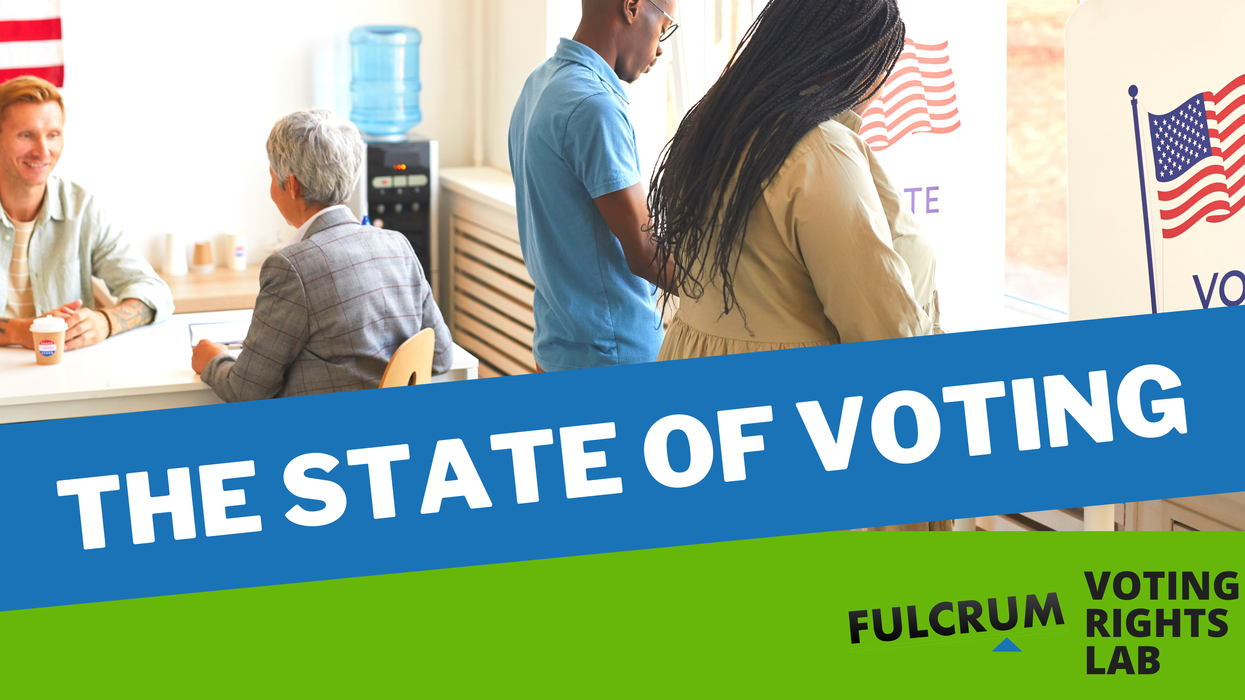This weekly update summarizing legislative activity affecting voting and elections is powered by the Voting Rights Lab. Sign up for VRL’s weekly newsletter here.
The Voting Rights Lab is tracking 2,185 bills so far this session, with 579 bills that tighten the rules governing voter access or election administration and 1,041 bills that expand the rules.
Both New Hampshire and Pennsylvania created new avenues to criminalize the actions of election officials last week, and newly filed Wisconsin litigation seeks to force election officials to reject mail ballots cast by eligible voters due to minor omissions by a voter’s witness.
Meanwhile, in North Carolina a federal court decision gave voters with disabilities more flexibility in finding assistance, and the governor signed a budget bill that will fund the state’s membership in ERIC, a database that helps states maintain accurate voter lists. Also, California lawmakers sent a bill to the governor that would provide better transparency around signature verification.
Here are the details:
A federal judge blocked a North Carolina law that restricted assistance for voters with disabilities, and the governor signed a budget bill that includes funding for North Carolina to join ERIC for one year. A federal judge found that a state law violated the Voting Rights Act because it prohibited people living in facilities such as nursing homes, hospitals and clinics from relying on employees of those facilities for help in applying for, completing and returning mail ballots. The law only allowed voters to receive assistance from a close relative or legal guardian; following the court’s permanent injunction, North Carolina voters with disabilities will be able to receive assistance from anyone they choose.
Meanwhile, Gov. Roy Cooper signed H.B. 103, which provides funding for North Carolina to join the Electronic Registration Information Center, which houses a database used by 31 other states and Washington, D.C., to maintain accurate voter lists. While the budget bill provides funding for North Carolina to join ERIC, it only funds the state’s membership for one year rather than annually. The bill also requires that the State Board of Elections seek the legislature’s approval prior to making any changes to election policies or procedures if required for ERIC membership, which may limit the board’s ability to use the database.
New Hampshire enacts laws criminalizing election officials for good-faith conduct. Gov. Chris Sununu signed H.B. 1567, legislation that removes the attorney general’s discretion when it comes to election law – and instead requires the office to investigate all alleged misconduct by election officials. When applied in conjunction with another bill enacted during the 2022 legislative session ( S.B. 418) this could result in the prosecution of election officials for good-faith execution of their responsibilities. S.B. 418 further creates a potentially unworkable administrative timeline that may cause election officials to miss deadlines for mailing out ballots to active military voters in 2024.
Pennsylvania creates new criminal penalties for election officials and prohibits private funding of elections – but also provides new public funding. Last Monday, Gov. Tom Wolf signed a law that prohibits private funding of elections and enforces the prohibition with new criminal penalties for election officials who violate it. Notably, however, the new law allows the private donation of voting locations and volunteer services to continue. It also creates a grant program to provide public funding if counties commit to following certain election procedures, such as early processing of mail ballots.
New Wisconsin litigation seeks to reject mail ballots cast by eligible voters due to minor omissions by a voter’s witness. A new lawsuit seeks to force election officials to reject the ballots of eligible Wisconsin voters over minor omissions, such as a missing ZIP code for their witness. Wisconsin is one of a small number of states that requires voters to fill out their mail ballots in front of a witness. After the voter puts the ballot in the certificate envelope and signs and seals it, the witness must also sign and put their address on the certificate envelope. In accordance with guidance issued by the Wisconsin Election Commission in 2016, election officials may fill in missing witness address information in certain circumstances. If this litigation is successful, they will be prohibited from doing so in future elections, and will instead be required to reject mail ballots that are missing any witness address information. This new litigation comes on the heels of a Wisconsin Supreme Court decision issued last week that overruled previous WEC guidance and prohibited drop boxes.
California sends a bill to the governor that provides greater transparency to the signature verification process. The California Legislature sent A.B. 1619 to the governor’s desk, a bill that would ensure voters are informed when they register to vote that the signature they provide during the registration process will be used to validate the signature on their mail ballot.



















Trump & Hegseth gave Mark Kelly a huge 2028 gift